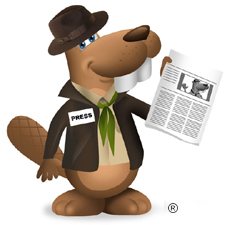Journalism


Resources
Journalism Requirements
Current Scouts BSA requirements
as of February 19, 2026
as of February 19, 2026
1.
Explain what freedom of the press is and how the First Amendment guarantees
that you can voice your opinion. In your discussion, tell how to
distinguish between fact and opinion, and explain the terms libel,
slander, defamation, fair comment and criticism, public figure,
privacy, and malice. Discuss how these matters relate to ethics
in journalism.
2.
Do ONE of the following:
Option A—Newspaper, Magazine, and Online Journalism.
(Ask your parent or guardian's permission for online option).
Do ALL of the following:
1.
On the same day, read a local news source or newspaper, a national
news source or newspaper, a news magazine (online or printed) and a
social media news feed. From each source, clip, read, and compare a
story about the same event. Tell your counselor how long each story
is and how fair and accurate the stories are in presenting
different points of view. Tell how each source handled the story.
2.
Visit the office of a newspaper, magazine, or internet news site.
Ask for a tour of the various divisions (editorial, business, and
printing). During your tour, talk to an executive from the business
side about management's relations with reporters, editors, and
photographers and what makes a "good" newspaper, magazine, or
internet news site.
Note: If there are no opportunities for in-person visits
in your community, a virtual visit is acceptable with the news site of
your choice, provided your counselor approves this option in advance.
(You can request a virtual visit with Scout
Life magazine.)
Option B—Radio and Television Journalism. Do ALL of the
following:
1.
All on the same day, watch a local and national network newscast,
listen to a radio newscast, and (with your parent or guardian's
permission) view a national broadcast news source online. List the
different news items and features presented, the different elements
used, and the time in minutes and seconds and the online space
devoted to each story. Compare the story lists and discuss whether
the stories are fair and accurate. Explain why different news
outlets treated the stories differently and/or presented a
different point of view.
2.
Visit a radio or television station. Ask for a tour of the various
departments, concentrating on those related to news broadcasts.
During your tour, talk to the station manager or other station
management executive about station operations, particularly how
management and the news staff work together, and what makes a
"good" station. If possible, go with a reporter to cover a news
event.
3.
Discuss the differences between a hard news story and a feature story.
Explain what the five W's and H are. Then do ONE of the following:
a.
Choose a current or an unusual event of interest to you, and write
either a hard news article OR a feature article about the event. Gear
the article for print OR online OR audio OR video journalism. Share your article
with your counselor.
b.
With your parent or guardian's permission and counselor's approval,
interview someone in your community who is influential because of his
or her leadership, talent, career, or life experiences. Then present to
your counselor either a written or oral report telling what you learned
about this person.
c.
With your parent or guardian's permission and counselor's approval,
read an autobiography written by a journalist you want to learn more
about. Write an article that tells what you learned about this person
and the contributions this person has made to the field of journalism.
d.
Attend a Scouting event and write a 200-word article (feature or hard
news) about the event. Use either the inverted pyramid style or the
chronological style. Review the article with your counselor, then
submit it to your community newspaper or Scouting America local council
or district newsletter for consideration.
4.
Attend a public event and do ONE of the following:
a.
Write two articles about the event, one using the inverted pyramid
style and one using the chronological style.
b.
Using a radio, television, or podcasting style, write a news story, a
feature story, and a critical review of the event.
c.
Take a series of photographs to help tell the story of the event in
pictures. Include news photos and feature photos in your presentation.
Write a brief synopsis of the event as well as captions for your
photos.
5.
Identify three career opportunities that would use skills and knowledge in
journalism. Pick one and research the training, education, certification
requirements, experience, and expenses associated with entering the field.
Research the prospects for employment, starting salary, advancement
opportunities and career goals associated with this career. Discuss what
you learned with your counselor and whether you might be interested in
this career.